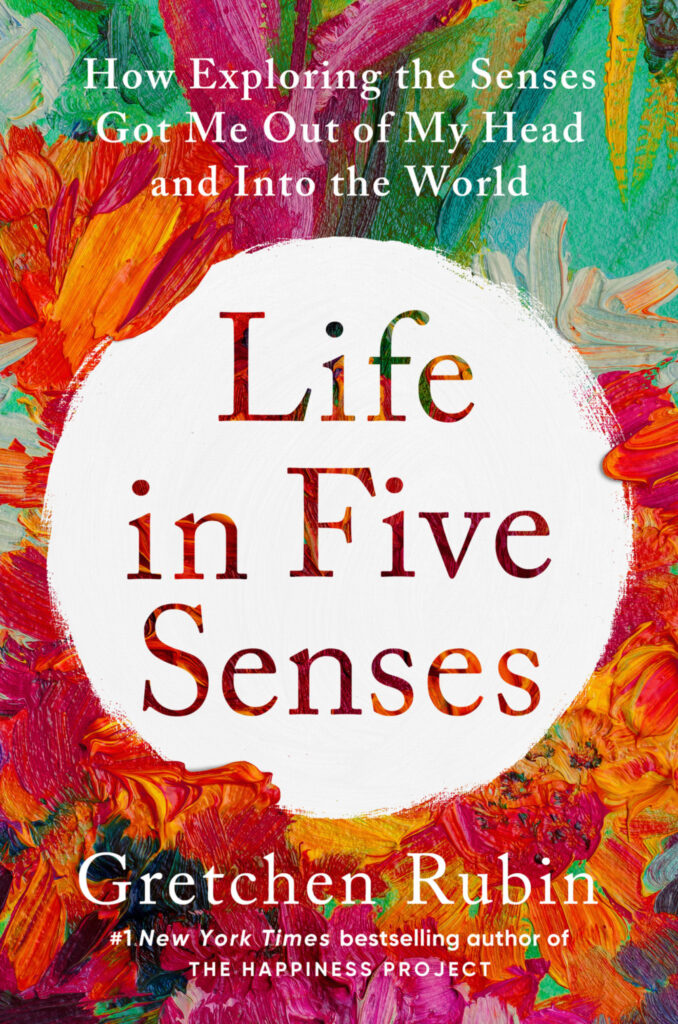Do you ever feel disconnected from the world? Maybe you’re speed walking across campus to psych 101 or you’re cramming at the coffee shop, sucked into your laptop. Gretchen Rubin realized that she might be disengaged too, stuck in her head. Her solution? To connect to her senses. As a happiness researcher, founder of the Happiness Project, and a NYTs Bestselling Author, Gretchen decided to turn this idea into an experiment and new book, Life in the Five Senses.
In her book, Rubin uncovers the transformative power of the five senses and how we can use them to lead a more joyful life.
You get to come along for the ride as she re-energizes her daily rituals, finds ways to appreciate simple pleasures and even experiments with ayahuasca. Rubin believes happiness is achievable for everyone, which means us college students too.
“I think a lot of us have [senses] that we really engage with, and then others we neglect,” she said. When you can re-engage those neglected senses, your happiness levels will thank you. Your five senses can offer you an immediate way to cheer up, engage with the world, and de-stress…in other words, why not explore our senses more? We all know that happiness can help our academic performance, mental health, and overall well-being.
So what senses are you neglecting in the chaos of everyday life? (If you’re not sure, you can take Rubin’s free quiz.) For Rubin, one sense she had overlooked was her hearing. She always thought of herself as someone who didn’t love music. Walking around New York City seeing everyone with their headphones on, hearing people talk about their favorite songs, she just couldn’t relate. That is until a friend of hers told her that she probably appreciated music in her own way. And when you think about it, don’t we all have a unique sense of music?
“I stepped back and thought, ‘How do I appreciate music?’ I don’t listen to a genre; I’m not interested in listening to new music. I like the songs I like,” Rubin said. “Once I embraced that, I found more pleasure in [music] because I was like, ‘there’s no right or wrong way.’”
Rubin practices everything she preaches. She’s her very own guinea pig. “It works very well to make myself the prime test candidate. They say you teach what you want to learn, so it’s very appealing to me that I always pick a subject where I’m like, ‘I want to do this. This is something I want to figure out for myself as much as for anybody else,’” Rubin said.
Rubin’s learned that her experiences are unique to herself and you may or may not have similar ideas on what happiness is and how to achieve it. Knowing this and having tried some trending activities, like meditation, Rubin isn’t about to tell anyone to do something just because it sounds cool or looks aesthetically pleasing. No. Rubin’s more interested in abstract ideas and turning information into practical use. “I’m very interested in how an ordinary person, without spending a lot of time, energy or money, could learn from all this knowledge about ways to be happier,” Gretchen Rubin said.

Rubin shares some small changes that can alleviate your daily stressors such as studying for finals.
Your sense of sight can affect your focus when it comes to studying. You’ve probably heard how your phone is so distracting that you either need to turn off your phone or hide it in another room while you study. But what if instead, you made your phone less enticing to your eyes? Rubin suggests turning your phone to grayscale. The change won’t disable any apps on your phone but removes the vibrant colors that invite you to mindlessly scroll, making your phone less enticing during your study sessions.
You can also create your ideal sensory environment. “When people need focus, some people want music, [or] silence, [or] they want to be in a coffee shop. But maybe that doesn’t actually work well for you,” said Rubin. “I think a lot of people don’t spend enough time thinking about their own idiosyncratic preferences. Sometimes you can’t control it a hundred percent, but there are often things that you can do that can make your sensory environment more suited to your idiosyncrasies.”
Rubin suggests creating this ideal environment through touch. Whether it’s a fidget toy to keep your hands occupied during a lecture or knitting to help you think, there are many physical objects that can appeal to your sense of touch and help you stay focused. It’s a minor change but can have a massive impact, especially if your mind drifts during study sessions and classes.
While your ideal sensory environment may seem perfect to you, Rubin reminds us that it might not align with others’ interpretations, especially when you’re sharing spaces with a lot of people. Whether you’re in your dorm room, a common space, the library or elsewhere on campus, sharing your personal space with others can lead to tedious conflicts, like debating if your music’s too loud or your food is too smelly.
“People live in very different sensory environments, so we want to create an environment where everyone can thrive,” Rubin said. This means having consideration for others’ sensory needs. “If somebody’s complaining about something, it’s just that they’re attuned to things you’re not attuned to. For one person, it’s incredibly important that it’s dark [to sleep], and you’re like, ‘Who cares if it’s 100% dark at night?’ But for some people, the sight of a little light will be very distracting to them and make it hard to sleep,” Rubin said.
In her new book Life in Five Senses, Rubin elaborates on these tips and explores the senses more deeply, giving us all the tools we need to re-engage with the world and improve our happiness. “If you feel stuck in your head, trapped behind a screen, or you walk around in a fog of preoccupation all the time, this is a way to get you excited. With lots of ideas to make direct contact with the world, it’s very energizing [and] super fun,” Rubin said.

















